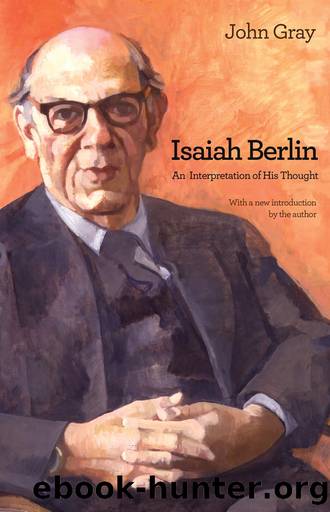Isaiah Berlin by John Gray

Author:John Gray
Language: eng
Format: epub
Publisher: Princeton University Press
Published: 2020-06-15T00:00:00+00:00
4
Nationalism
. . . What is here entailed is that the highest ends for which men have rightly striven and sometimes died are strictly incompatible with one another. Even if it were possible to revive the glories of the past as those pre-historicist thinkers (Machiavelli or Mably, for instance) thought, who called for a return to the heroic virtues of Greece or Rome, we could not revive and unite them all. If we choose to emulate the Greeks, we cannot also emulate the Hebrews; if we model ourselves on the Chinese, whether as they are in reality, or in Voltaire’s opéra bouffe version, we cannot also be the Florentines of the Renaissance, or the innocent, serene, hospitable savages of the eighteenth-century imagination. Even if, per impossible, we could choose among these ideals, which should we select? Since there is no common standard in terms of which to grade them, there can be no final solution to the problem of what men as such should aim at. The supposition that this question can, at least in principle, be answered correctly and finally, which few had seriously doubted since Plato had taken it for granted, is undermined. Herder, of course, condemns the very wish to resurrect ancient ideals: ideals belong to the form of life which generates them, and are mere historical memories without them. Values—ends—live and die with the social wholes of which they form an intrinsic part. Each ‘collective individuality’ is unique, and has its own aims and standards, which will themselves inevitably be superseded by other goals and values—ethical, social and aesthetic. Each of these systems is objectively valid in its own day, in the course of ‘Nature’s long year’ which brings all things to pass. All cultures are equal in the sight of God, each in its time and place. Ranke said precisely this; his theodicy is a complacent version of Herder’s theses, directed equally against those of Hegel and moral scepticism. But if this is so, then the notion of the perfect civilization in which the ideal human being realizes his full potentialities is patently absurd: not merely difficult to formulate, or impossible to realize in practice, but incoherent and unintelligible. This is perhaps the sharpest blow ever delivered against the classical philosophy of the West, to which the notion of perfection—the possibility, at least in principle, of universal, timeless solutions of problems of value—is essential.
Isaiah Berlin, ‘Herder and the Enlightenment’1
ONE OF THE MOST SIGNIFICANT aspects of Berlin’s treatment of nationalism is its recurrence to an older, and in many ways a wiser, tradition of liberal thought. Nineteenth-century European liberal thinkers, by contrast with their Enlightenment predecessors and their twentieth-century successors, grasped the importance to human beings of collective identities other than, and more particularistic than, that of the species as a whole. It is a feature of the thought of Benjamin Constant, of Alexis de Tocqueville, of John Stuart Mill, for example, that they perceived in the sentiment of nationality an important source of social solidarity, and of the political stability of a liberal society.
Download
This site does not store any files on its server. We only index and link to content provided by other sites. Please contact the content providers to delete copyright contents if any and email us, we'll remove relevant links or contents immediately.
Hit Refresh by Satya Nadella(9134)
When Breath Becomes Air by Paul Kalanithi(8447)
The Girl Without a Voice by Casey Watson(7889)
A Court of Wings and Ruin by Sarah J. Maas(7847)
Do No Harm Stories of Life, Death and Brain Surgery by Henry Marsh(6941)
Shoe Dog by Phil Knight(5268)
The Rules Do Not Apply by Ariel Levy(4969)
A Higher Loyalty: Truth, Lies, and Leadership by James Comey(4964)
Hunger by Roxane Gay(4928)
Tuesdays with Morrie by Mitch Albom(4784)
Everything Happens for a Reason by Kate Bowler(4743)
The Immortal Life of Henrietta Lacks by Rebecca Skloot(4588)
Millionaire: The Philanderer, Gambler, and Duelist Who Invented Modern Finance by Janet Gleeson(4478)
How to Change Your Mind by Michael Pollan(4356)
All Creatures Great and Small by James Herriot(4322)
The Money Culture by Michael Lewis(4207)
Man and His Symbols by Carl Gustav Jung(4135)
Elon Musk by Ashlee Vance(4127)
Tokyo Vice: An American Reporter on the Police Beat in Japan by Jake Adelstein(3996)
